To enhance productivity, promote accurate citation practices, and streamline the complex process of organizing references, there are many tools (citation management tools) to help researchers, academics, students, and anyone engaged in scholarly research.
In this article we will talk about what are these tools, why it's important to use them and what are the characteristic of each.
What is a citation management tool?
Citation management tools, also known as reference managers or bibliography managers, are software or online services designed to help researchers, students, and academics organize, store, and cite references used in their scholarly work.
These tools streamline the process of managing citations, bibliographies, and reference lists, making it easier to maintain a consistent and accurate list of sources used in research papers, theses, dissertations, and other academic publications.
What are the key features of citation management tools?
Key features of citation management tools typically include:
Reference Collection:
The ability to import, store, and organize references from various sources, such as academic databases, websites, books, and articles.
Citation Generation:
Automatic generation of citations in various citation styles (e.g., APA, MLA, Chicago) based on the information stored for each reference.
Bibliography Creation:
The tool can generate a formatted bibliography or reference list based on the citations used in a document.
PDF Management:
Many citation managers allow users to attach PDFs of research papers to their references, enabling easy access and annotation.
Tagging and Categorization:
The capability to add tags, keywords, and custom categories to organize references by subject, project, or any other criteria.
Annotation and Note-taking:
Some tools offer annotation features, allowing users to highlight and add notes to PDFs and references.
Collaboration:
Some citation managers enable collaboration, letting users share references and collaborate on projects with other researchers.
Integration with Word Processors:
Seamless integration with word processing software (e.g., Microsoft Word, LaTeX) to insert citations and automatically format bibliographies.
By using a citation management tool, researchers can save time and ensure consistency in their reference lists, avoiding the manual effort of formatting citations and bibliographies.
Additionally, these tools can help prevent accidental plagiarism by providing accurate citation information.
Why should you use citation management tools?
Citation management tools are essential for several reasons:
Efficiency:
They streamline the process of organizing, storing, and citing references, saving researchers valuable time and effort. With these tools, researchers can focus more on their actual research rather than managing references manually.
Accuracy:
Citation managers help maintain accurate and consistent citations, reducing the risk of errors and ensuring proper credit to the original authors. This prevents accidental plagiarism and promotes academic integrity.
Bibliography Creation:
They enable easy generation of formatted bibliographies or reference lists, adhering to various citation styles (e.g., APA, MLA, Chicago). This simplifies the final stages of writing research papers, theses, and other academic works.
Reference Collection:
These tools allow researchers to import and store references from multiple sources, including academic databases, websites, and articles, making it convenient to access all relevant sources in one place.
PDF Management:
Citation managers often provide features for attaching PDFs of research papers to their corresponding references, allowing for easy access and annotation.
Organization:
With tagging, categorization, and note-taking capabilities, citation managers help researchers organize their references by subject, project, or any other relevant criteria, facilitating better research organization.
Collaboration:
Some citation managers offer collaboration features, allowing researchers to share references and work together on projects more effectively.
Seamless Integration:
They seamlessly integrate with word processing software (e.g., Microsoft Word, LaTeX), enabling researchers to insert citations and format bibliographies automatically within their documents.
Overall, citation management tools significantly enhance researchers' productivity, promote accurate citation practices, and streamline the complex process of organizing references.
They are indispensable tools for academics, students, and anyone engaged in scholarly research.
What are the 20 best citation management tools?
Here are ten of the best citation management tools commonly used by researchers, students, and academics to organize and manage references:
1. RefWorks
RefWorks is a web-based citation management tool provided by ProQuest. It allows researchers, students, and academics to organize, store, and cite references for their scholarly work.
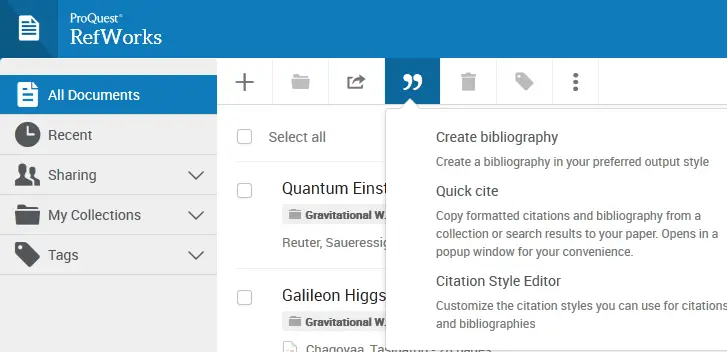
RefWorks streamlines the process of managing citations and bibliographies by offering features like reference importing, citation generation in multiple styles (e.g., APA, MLA, Harvard), and collaborative capabilities for sharing references with others.
Users can easily collect references from various sources, such as academic databases, websites, and library catalogs, and organize them using tags and folders.
RefWorks also offers seamless integration with word processing software, allowing users to insert citations and automatically format bibliographies within their documents.
With its cloud-based approach, RefWorks enables users to access their references and documents from any device with an internet connection.
RefWorks is widely used by students, researchers, and librarians to facilitate accurate and efficient citation management, enhancing the overall quality of academic writing and research projects.
2. Zotero
Zotero is a powerful, free, and open-source citation management tool that helps researchers, students, and academics organize, store, and cite references for their scholarly work.
It is available as a standalone desktop application and as a browser extension, making it easy to collect and save references from various sources, such as websites, academic databases, and library catalogs.
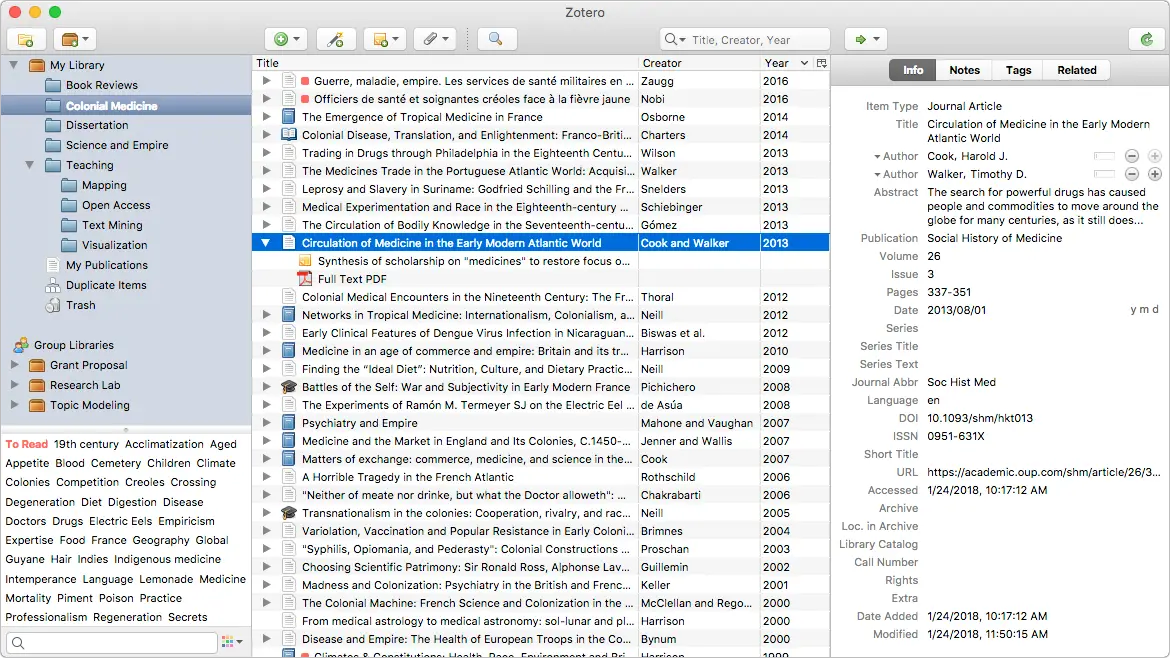
Zotero offers a user-friendly interface that allows users to manage their references efficiently. It supports citation generation in a wide range of citation styles, including APA, MLA, Chicago, and more. With its PDF management capabilities, users can attach PDFs of research papers to their references, enabling easy access and annotation.
One of Zotero's key strengths is its ability to automatically extract citation metadata from websites, simplifying the reference collection process. It also provides collaborative features, making it possible for researchers to share references and collaborate on projects with colleagues.
Zotero's integration with word processing software like Microsoft Word and LibreOffice allows users to insert citations and create formatted bibliographies seamlessly. Furthermore, since it is open-source, Zotero enjoys a strong and active community of users and developers, leading to continuous improvement and updates.
Overall, Zotero is a highly regarded citation management tool that is widely used for its versatility, user-friendliness, and robust features, making it an excellent choice for individuals and teams involved in academic and research endeavors.
3. Mendeley
Mendeley is a comprehensive reference management tool developed by Elsevier, designed to assist researchers, students, and academics in organizing, storing, and citing references for their scholarly work. It offers a combination of a desktop application and a web-based platform, providing users with the flexibility to access their references from anywhere.
With Mendeley, users can easily collect and import references from various sources, including academic databases, websites, and library catalogs. The tool's PDF management features allow users to attach and organize PDFs of research papers to their respective references.
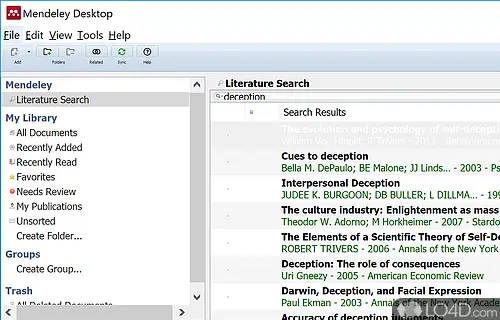
Mendeley's social networking component allows researchers to connect with peers and discover relevant articles and papers in their fields of interest. It facilitates collaboration and sharing of references, making it a valuable platform for team projects and academic networking.
One of Mendeley's strengths lies in its powerful search and organization capabilities, as well as its integration with academic databases and publishers, which simplifies the process of finding and importing references.
The tool supports citation generation in various citation styles, such as APA, MLA, and Chicago, and it seamlessly integrates with popular word processing software like Microsoft Word and LibreOffice for efficient citation insertion and bibliography creation.
Mendeley's combination of reference management features, collaboration tools, and social networking elements makes it a popular choice for researchers seeking an all-in-one solution to streamline their academic workflows and enhance their research efficiency.
4. EndNote
EndNote is a widely used reference management software provided by Clarivate Analytics. It is designed to assist researchers, students, and academics in organizing, storing, and citing references for their scholarly work. EndNote offers both a desktop application and an online version, providing users with the flexibility to access their references from various devices.
EndNote allows users to import and organize references from multiple sources, including academic databases, websites, library catalogs, and other reference management tools. It supports a vast array of citation styles, making it suitable for researchers in various disciplines.
The software offers advanced features such as the ability to search and download full-text PDFs, annotate PDFs, and attach files to references, enabling users to keep all relevant research materials in one place.
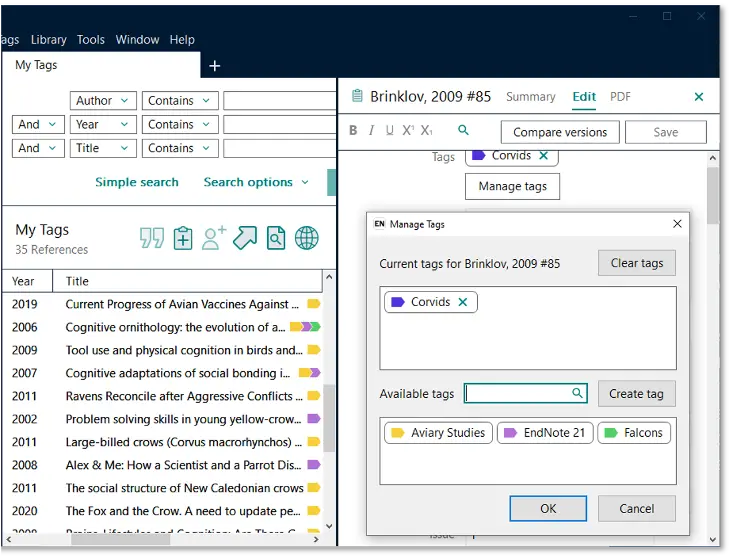
EndNote's integration with word processing software like Microsoft Word and Pages allows for seamless citation insertion and automated bibliography creation. Users can easily switch between citation styles without manually reformatting their entire document.
Furthermore, EndNote provides options for sharing references with collaborators, making it a valuable tool for research teams and collaborative projects.
Overall, EndNote is recognized for its robust features, search capabilities, and compatibility with various reference databases and publishers. It remains a popular choice among researchers and academics who seek a comprehensive reference management solution to streamline their research and academic writing processes.
5. BibDesk
BibDesk is a reference management software designed specifically for macOS users. It is commonly used by researchers, academics, and students on Apple devices to organize, store, and cite bibliographic references and research materials.
BibDesk allows users to create and maintain a database of bibliographic references, including journal articles, books, conference papers, and other scholarly works.
Users can import references into BibDesk from various sources, such as academic databases, library catalogs, and websites. It supports importing references in various formats, including BibTeX and RIS. BibDesk supports citation generation in multiple citation styles, making it convenient for researchers to cite their references in academic papers.
BibDesk is highly customizable, allowing users to define custom fields, keywords, and tags to organize their references according to their specific research needs. BibDesk seamlessly integrates with LaTeX documents, making it convenient for researchers who use LaTeX as their preferred typesetting system.
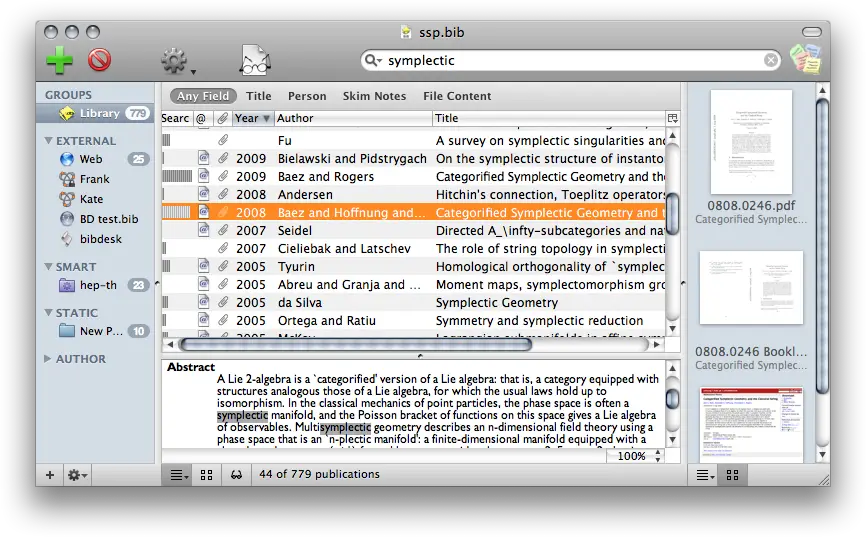
Although BibDesk is natively designed for macOS, it can also be used on other platforms through compatibility layers like MacPorts or Homebrew.
BibDesk is developed as an open source project and available free of charge
6. Citavi
Citavi is a comprehensive reference management and knowledge organization tool designed to support researchers, students, and academics in their academic writing and research projects. It is widely used in academic and scholarly environments to streamline the process of collecting, managing, and citing references.
Citavi allows users to import and organize references from various sources, including academic databases, library catalogs, and websites. It offers advanced search and filtering options to efficiently find relevant sources for research.
The tool provides extensive support for PDF management, enabling users to annotate PDFs, extract metadata, and easily attach them to their respective references.
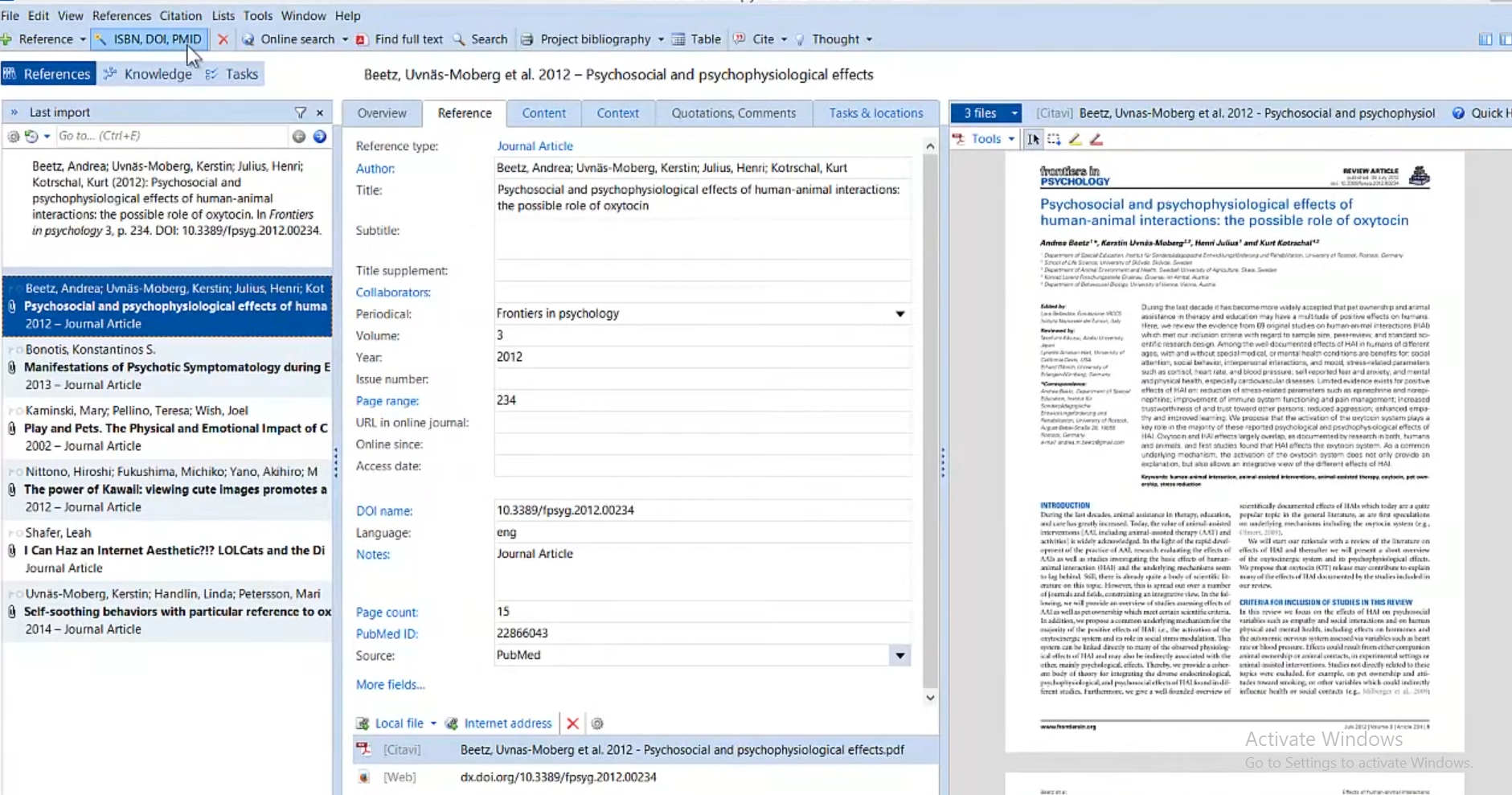
Citavi's knowledge organization features include the ability to create categories, keywords, and annotations, helping users to structure and group their research materials effectively.
It supports citation generation in various citation styles, making it suitable for researchers in different disciplines. Additionally, Citavi integrates seamlessly with popular word processing software like Microsoft Word and supports the use of add-ins for citation insertion and bibliography creation.
Collaboration is another significant aspect of Citavi, allowing researchers to work together on projects, share references, and synchronize their libraries.
Furthermore, Citavi offers features for task management, outlining, and note-taking, providing a comprehensive solution for the entire research process.
Overall, Citavi is recognized for its user-friendly interface, robust features, and focus on knowledge organization, making it a valuable tool for researchers looking to enhance their productivity and efficiently manage their academic writing and research projects.
7. Papers
Papers is a reference management tool and PDF organizer that helps researchers, students, and academics collect, organize, and cite references for their academic work. Originally developed for macOS, Papers is now available for both Mac and Windows users.
Papers offers a user-friendly interface that simplifies the process of importing and organizing references from various sources, including academic databases, websites, and library catalogs. It also provides powerful search and filtering options to efficiently find relevant research materials.
One of Papers' key strengths is its focus on PDF management. Users can attach PDFs of research papers to their references, enabling easy access and annotation. The tool also supports full-text search within PDFs, making it convenient to find specific information within the documents.
Papers offers citation generation in multiple citation styles, such as APA, MLA, and Chicago, and integrates seamlessly with word processing software like Microsoft Word and Pages for citation insertion and bibliography creation.
The tool includes features for collaboration, allowing researchers to share references and collaborate on projects with others. Papers also provides cloud synchronization, enabling users to access their references and PDFs across different devices.
Papers has a built-in reader that offers a distraction-free reading experience, making it easier for researchers to focus on their research materials without distractions.
Overall, Papers is well-regarded for its PDF management capabilities, user-friendly interface, and seamless integration with word processors, making it a popular choice for researchers seeking a simple yet powerful reference management tool.
8. ReadCube
ReadCube is a reference management tool and research platform designed to enhance the way researchers discover, read, organize, and cite scholarly literature. It offers a feature-rich experience to facilitate academic research and collaboration.
One of ReadCube's key features is its advanced PDF management capabilities. It provides tools for annotating, highlighting, and adding notes to PDFs, allowing users to interact with their research materials effectively. Moreover, ReadCube offers a unique "Enhanced PDF" format for some articles, which enhances readability and improves the overall research experience.
9. JabRef
JabRef is an open-source reference management tool primarily used by researchers and academics working with LaTeX, a typesetting system commonly used for academic and scientific documents. It provides a user-friendly graphical interface for managing and organizing bibliographic references.
With JabRef, users can import references from various sources, such as academic databases, library catalogs, and websites, and organize them using customizable tags, groups, and keywords.
JabRef supports the BibTeX and BibLaTeX formats, which are essential for integrating citations into LaTeX documents seamlessly. Users can create a separate ".bib" file to store their references, and JabRef ensures the proper formatting and citation style when used in LaTeX documents.
The tool allows for easy searching and filtering of references, and it offers features like duplicate detection to ensure data consistency in the reference library.
JabRef enables users to generate and customize citation keys automatically, making it convenient to cite references in LaTeX documents efficiently.
10. MyBib
MyBib is a free and user-friendly online citation generator and reference management tool. It is designed to help students, researchers, and academics create accurate citations and bibliographies for their academic papers and research projects.
MyBib allows users to generate citations in various citation styles, including APA, MLA, Chicago, Harvard, and more. Users can input the necessary details of a source, and MyBib will automatically generate the citation in the selected style.
The tool supports importing references from various sources, including academic databases, library catalogs, and websites. Users can also manually enter citation information for sources not available in other databases.
MyBib likely allows users to save and share their citation lists and bibliographies with others, making it convenient for collaborative research projects. MyBib offers a web browser extension for capturing and saving research materials from websites and online sources.
The platform may provide cloud-based storage for saving and accessing citation lists and bibliographies from any device with internet access. MyBib allows users to export their citation lists and bibliographies to various formats for easy sharing and integration with other applications.
11. EasyBib
EasyBib is a popular citation management tool that helps students and researchers generate accurate citations and bibliographies. It offers a user-friendly interface that simplifies the process of citing sources in various formats, including APA, MLA, Chicago, and more.
EasyBib supports citation creation for a wide range of sources, such as books, articles, websites, and videos, making it a valuable resource for academic writing.
Additionally, EasyBib provides writing resources and citation guides to assist users in mastering proper citation practices. It is commonly used in educational settings to promote accurate and consistent referencing and to aid students in avoiding plagiarism in their academic work.
12. Cite This for Me
Cite This for Me is an online citation generator and reference management tool that helps students, researchers, and academics create accurate citations and bibliographies for their academic papers and research projects. It provides a simple and user-friendly interface for generating citations in various citation styles, including APA, MLA, Chicago, Harvard, and many others.
Users can input the necessary details of a source, such as the author(s), title, publication date, and publication source, and "Cite This for Me" will automatically generate the citation in the selected citation style. The tool supports a wide range of source types, including books, articles, websites, and videos.
Additionally, "Cite This for Me" offers browser extensions for popular web browsers, allowing users to cite online sources with just a few clicks while browsing the web.
Please note that "Cite This for Me" is a web-based citation generator and does not provide the full reference management features found in comprehensive reference management tools like Zotero or Mendeley. It is best suited for quick and straightforward citation generation and may be a helpful resource for students and researchers who need to cite sources accurately and efficiently. However, for more extensive reference management needs and organization capabilities, users may consider using dedicated reference management software.
13. Bookends
Bookends is a reference management software designed for macOS users, particularly researchers, students, and academics. It offers a comprehensive set of features to help users organize, store, and cite references for their academic and scholarly work.
Users can import references from various sources, including academic databases, library catalogs, and websites. Bookends supports a wide range of reference types, making it suitable for various academic disciplines.
Bookends offers citation generation in multiple citation styles, including APA, MLA, and Chicago. It seamlessly integrates with word processing software like Microsoft Word and Apple Pages for efficient citation insertion and bibliography creation.
Users can annotate PDFs and add notes to references, aiding in the research process and keeping track of important details. The software integrates with various academic databases, allowing users to search and import references directly from these databases.
14. Docear
Docear is an open-source reference management software that combines the functionalities of a reference manager, mind mapping tool, and academic literature suite. It is designed to assist researchers and students in organizing their academic literature, managing references, and creating structured knowledge representations.
Docear offers a mind mapping component that allows users to create visual representations of their research ideas, literature, and concepts. This feature facilitates brainstorming and helps users see the connections between different research elements.
Users can import and organize references from various sources, including BibTeX and PDF files. Docear supports popular citation styles and integrates with word processing software for citation insertion and bibliography creation.
15. RefDB
RefDB is an open-source reference management system designed to help researchers, academics, and institutions manage and organize bibliographic references and research data. It is commonly used in academic and scientific environments where researchers need to maintain large databases of references and research materials.
RefDB allows users to create and maintain a database of bibliographic references, including journal articles, books, conference papers, and other scholarly works.
RefDB uses the BibTeX format, a widely used format for managing bibliographic references in LaTeX documents.
Users can import references into RefDB from various sources, including BibTeX files and other reference management systems. Similarly, it supports exporting
16. Citationsy
Citationsy is a web-based reference management tool and citation generator designed to assist researchers, students, and academics in creating accurate citations and bibliographies for their academic papers and research projects.
Citationsy allows users to generate citations in various citation styles, such as APA, MLA, Chicago, Harvard, and more. Users can input the necessary details of a source, and Citationsy will automatically generate the citation in the selected style.
17. Paperpile
Paperpile is a reference management tool and web-based platform designed for researchers, academics, and students to manage, organize, and cite academic references and research materials. It is known for its seamless integration with Google Workspace (formerly G Suite), making it a popular choice for users who use Google Docs and Google Drive for their academic writing and collaboration.
Paperpile allows users to import references from various sources, such as academic databases, websites, and library catalogs. It supports multiple formats for easy reference import.
Paperpile supports citation generation in various citation styles, including APA, MLA, Chicago, and more. Users can cite their references directly within Google Docs using the Paperpile add-on.
The tool offers PDF management features, allowing users to attach and organize PDFs of research papers to their references. Users can also highlight and annotate PDFs directly within Paperpile.
One of Paperpile's main strengths is its seamless integration with Google Docs, making it easy to insert citations and create formatted bibliographies directly within the document.
The platform offers cloud-based synchronization, ensuring that users can access their reference library and research materials from any device with internet access.
18. Sciwheel
SciWheel is a reference management tool and research platform designed to assist researchers, academics, and students in organizing, storing, and citing bibliographic references and research materials. Please note that the information provided here may be subject to change, and I recommend visiting the SciWheel website for the most current information.
SciWheel allows users to import and organize references from various sources, such as academic databases, library catalogs, and websites. It supports multiple formats for easy reference import.
SciWheel supports citation generation in various citation styles, making it convenient for researchers to cite their references in academic papers and projects.
SciWheel offers a web browser extension for capturing and saving research materials from websites and online sources. SciWheel may include note-taking and annotation features to help users add comments or context to their saved references.
SciWheel may integrate with popular word processing software, allowing users to insert citations and create formatted bibliographies within their documents. The platform likely offers cloud-based synchronization, ensuring that users can access their reference library and research materials from any device with internet access.
19. RefBase
RefBase is an open-source web-based reference management system designed for researchers, academics, and institutions to organize, store, and share bibliographic references and research materials. It offers a comprehensive set of features for managing scholarly literature and citations.
RefBase allows users to create and maintain a database of bibliographic references, including journal articles, books, conference papers, and other scholarly works.
Users can import references into RefBase from various sources, such as BibTeX files and other reference management systems, facilitating the population of their reference library.
The software supports citation generation in multiple citation styles, making it convenient for researchers to cite their references in academic papers. RefBase provides a web-based interface, making it accessible from any device with internet access.
20. Sorc'd
Sorc'd is a web-based platform and reference management tool designed to help researchers, students, and professionals save, organize, and share research snippets, quotes, and citations from various sources.
Sorc'd allows users to clip and save snippets of text, quotes, or citations from web pages, articles, and other online sources. The platform offered tagging and organizational features, allowing users to categorize their saved snippets for easy retrieval and reference management.
Sorc'd have integrated with word processing software, allowing users to insert citations and quotes directly into their documents. The platform likely offered cloud-based storage for saved snippets, making them accessible from any device with internet access.
Other citation management tools
21. BibTeX
BibTeX is a bibliographic reference management tool used primarily with LaTeX, a typesetting system commonly used for writing academic and scientific documents. Unlike standalone citation managers, BibTeX is not a graphical user interface application but a file format used to store and manage references in LaTeX documents.
With BibTeX, users create a separate ".bib" file that contains the bibliographic information of their references in a structured format. Each reference entry in the BibTeX file follows a specific syntax and includes details such as the author(s), title, journal/book title, publication year, and other relevant information.
To cite references in a LaTeX document, users insert special commands (\cite{}, \bibliography{}, etc.) in their document's text and specify the ".bib" file where the references are stored. When the LaTeX document is compiled, BibTeX reads the ".bib" file, generates the correct citations, and formats the bibliography according to the chosen citation style.
BibTeX is widely used in academic and scientific writing, particularly in fields where LaTeX is the preferred typesetting system. It is especially popular in disciplines such as mathematics, computer science, physics, and engineering. Due to its efficiency and consistency, BibTeX remains a go-to choice for researchers and authors who value the precise and standardized management of references in their LaTeX documents.
22. BibGuru
BibGuru is a reference management tool and citation generator designed to help researchers, academics, and students create accurate citations and bibliographies for their academic papers and research projects.
BibGuru allows users to generate citations in various citation styles, such as APA, MLA, Chicago, Harvard, and more. Users can input the necessary details of a source, and BibGuru will automatically generate the citation in the selected style.
The tool supports importing references from various sources, including academic databases, library catalogs, and websites. Users can also manually enter citation information for sources not available in other databases.
